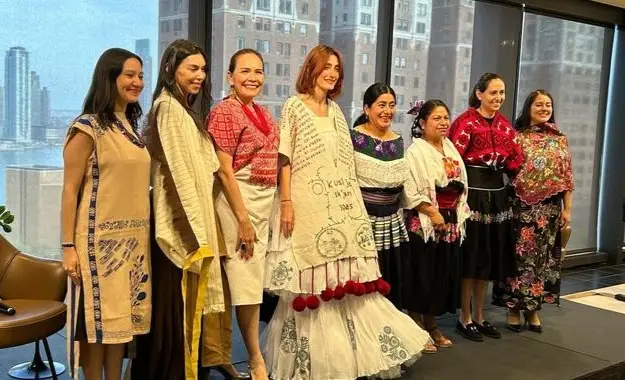To promote the empowerment and dignity of Indigenous peoples and within the framework of the 24th session of the United Nations Permanent Forum on Indigenous Issues, Mexico organized the side event “Indigenous Women Transforming Communities” at the Ford Foundation Social Justice Center in New York City, United States.
This initiative is part of the “Year of the Indigenous Woman” and is the result of a strategic collaboration between the government of Mexico, the Secretariat of Women and Gender Equality of Chiapas, the civil society organization NGO Impacto, the Ford Foundation, and Aeroméxico.
The event highlighted inspiring experiences of cross-sector collaboration between the public, private, and civil society sectors. It was co-sponsored by the governments of Chile, El Salvador, and Guatemala.
The panel included Graciela Gómez, Director General of Engagement with Civil Society Organizations at the Ministry of Foreign Affairs; Mónica Alemán, director of the Ford Foundation’s International Gender, Racial, and Ethnic Justice Program; Victoria Tubin, coordinator of the Presidential Commission Against Discrimination and Racism (CODISRA) in Guatemala; Francisca Gallegos, Undersecretary of Social Services at the Chilean Ministry of Social Development and Family; Elva Moreno, Human Development Coordinator at NGOimpacto; and Anita Ara, a master artisan from the Chiapas Highlands, representing the Jolob Antsetik group.
The speakers presented various models of economic, social, and psycho-emotional empowerment for indigenous women, as well as the positive impact of strategic alliances between governments, civil society organizations, and the private sector.
Significant was the participation of master artisan Anita Ara, who described the creation process of the collective piece “Dreams and Visions,” a huipil that, through the embroidery of seven artisan women, reflects their aspirations and life experiences.
A video was also presented about the collaboration between Aeroméxico, NGOimpacto, and the collective of 300 Tzeltal and Tzotzil women. This collaboration will result in the incorporation of an embroidered piece of their creation that will be featured on the company’s staff uniforms for the next five years.
The event concluded with a traditional textile show curated by NGOimpacto, showcasing pieces embroidered by artisans from the Chiapas Highlands.

Source: gob




